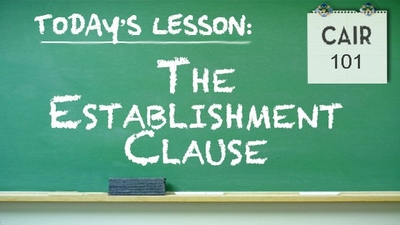CAIR
Conducted Sensitivity Training for Philadelphia Teachers
by John Rossomando
IPT News
October 11, 2017
|
|
|
|
Share:  
|
  Be the
first of your friends to like this. Be the
first of your friends to like this.
 Philadelphia's
public school system allowed the Council on American Islamic Relations
(CAIR) to conduct sensitivity training for its teachers last year, CAIR
press releases and school district documents obtained by the Investigative
Project on Terrorism show. Philadelphia's
public school system allowed the Council on American Islamic Relations
(CAIR) to conduct sensitivity training for its teachers last year, CAIR
press releases and school district documents obtained by the Investigative
Project on Terrorism show.
CAIR attorneys conducted a presentation for educators on Election Day,
focusing on Islamophobia and the civil rights of Muslim students, a
November press release said. The seminar was described as the
first in a series of planned workshops on those issues.
"In the current political environment, Muslim American students are
facing increased rates of bullying, emotional abuse, physical threats, and
verbal epithets due to their faith, race, or ethnicity," CAIR
Philadelphia said in the release.
CAIR Philadelphia provides zero evidence to support this assertion.
Still, the director of the school system's Multilingual Family Support
Center argued that, "We need CAIR helping our
schools."
Asheq Fazlullah, a member of CAIR Philadelphia's executive committee,
and then-CAIR
attorney Ryan Houldin conducted the Nov. 8 training, a school district email shows.
For a subsequent session, Fazlullah and Houldin would discuss
"issues of diversity, equity, and fairness" at a January 3
professional development day, Colette Langston, principal at Philadelphia's
Swenson Arts and Technology High School, wrote in an email to teachers. The
morning seminar was called, "Cultural Sensitivity and Diversity
Workshop #1 Topic: Islamophobia."
The school district did not provide course materials in response to the
IPT's public records request. School district officials did not respond to
queries as to whether they conduct sensitivity training for other religious
groups including Christians, Jews, Sikhs, or Hindus.
The school district's reliance on CAIR could raise constitutional issues
because the group's executive director has described CAIR as a religious
ministry.
Nihad Awad, CAIR's executive director, testified before the National
Labor Relations Board (NLRB) last spring that CAIR was a religious
organization whose primary purpose is to spread Islam.
"[Awad] testified at length about the Employer's role in conducting
educational services in the fields of religion, culture, education,
society, and history concerning Islamic issues. These services are provided
to both Muslims and non-Muslims alike. [Awad] described the Employer's role
in explaining the Islamic faith itself," Charles L. Posner, regional
director of the National Labor Relations Board, wrote in an April 7 ruling.
Awad's acknowledgement prompted the San Diego Unified School District
(SDUSD) to publicly back away from a CAIR-sponsored anti-bullying
program. The Freedom of Conscience Defense Fund (FCDF) was suing to bar CAIR from influencing public school
programming.
San Diego's anti-bullying plan violated California law, along with
students' 1st and 14th amendment rights because CAIR
is a religious organization and because the program gave Muslim students
special treatment, the lawsuit said.
Those arguments could apply equally to Philadelphia's public schools.
"The San Diego case is far from over, so there is no doubt it could
have precedential value in a legal challenge to Philadelphia schools'
partnership with CAIR," FCDF Executive Director Daniel Piedra told the
IPT.
School districts may not aid one religion, one religion over another, or
religion over non-religion, an American Civil Liberties Union (ACLU) legal bulletin said. It cites the seminal 1972 U.S. Supreme
Court case, Lemon v. Kurtzman.
"Under the so-called 'Lemon test,' a court must inquire (1) whether
the government's action has a secular or a religious purpose; (2) whether
the primary effect of the government's action is to advance or endorse
religion; and (3) whether the government's policy or practice fosters an
excessive entanglement between government and religion," the ACLU bulletin said.
In the San Diego case, FCDF argued that CAIR's definition of
Islamophobia is too vague and that what it considers bullying could ensnare
legitimate criticisms of Islamic practice. FCDF also asserted that the SDUSD's
"anti-bullying" program unconstitutionally established Muslims
"as a privileged group within the school community."
FCDF cited a 1993 statement by CAIR's national spokesman
Ibrahim Hooper to The Minneapolis Star-Tribune as part of its
complaint against SDUSD. Hooper told the
paper he "wouldn't like to create the impression that I wouldn't
like the government of the United States to be Islamic sometime in the
future. ... I'm going to do it through education."
"We know that CAIR is committed to advancing its anti-Islamophobia
initiative nationwide, so we are equally committed to making sure it dies
in San Diego. Ideally, that would be done by a precedential court
decision," Piedra said.
None of the school district records indicated that the program is being
repeated this school year. The Philadelphia School District declined to
comment whether the San Diego case would impact future decisions about
working with CAIR.
Related Topics: John
Rossomando, CAIR,
Philadelphia
public schools, establishment
clause, Asheq
Fazlullah, Ryan
Houldin, National
Labor Relations Board, Charles
L. Posner, San
Diego Unified School District, Daniel
Piedra, Freedom
of Conscience Defense Fund, Lemon
v. Kurtzman, ACLU
|































No comments:
Post a Comment